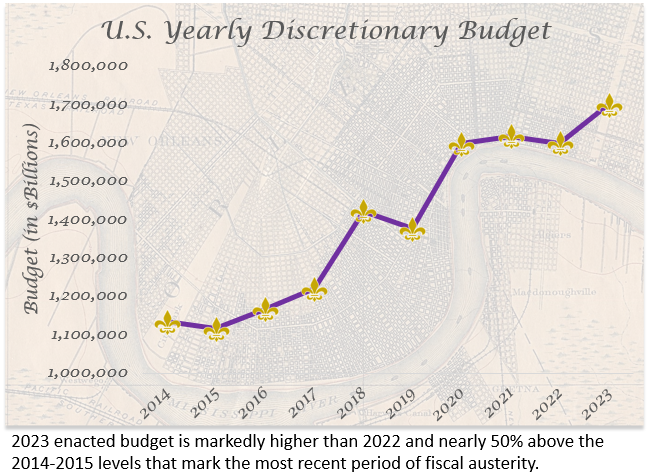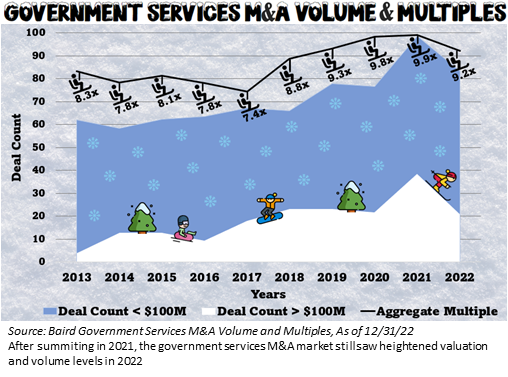January 25, 2023
Federal Funding Opportunities
U.S. Department of Energy; Office of Science Scientific Machine Learning for Complex Systems pre-applications due March 1, 2023
The Department of Energy’s program in Advanced Scientific Computing Research seeks research applications to explore potentially high-impact approaches in the development and use of scientific machine learning (SciML) and artificial intelligence in the predictive modeling, simulation and analysis of complex systems and processes. The focus of this funding opportunity is on basic research and development at the intersection of uncertainty quantification (UQ) and SciML applied to the modeling and simulation of complex systems and processes. In the context of this funding opportunity, UQ refers to the processes of quantifying uncertainties in a computed quantity of interest, with the goals of accounting for all sources of uncertainty and quantifying the contribution of specific sources to the overall uncertainty. For hybrid SciML modeling and simulations, the development and use of UQ will incorporate additional or other sources of uncertainties. Such considerations bring new basic research challenges in UQ beyond those encountered in traditional modeling and simulation approaches.
Forecasted: U.S. Department of Homeland Security; Federal Emergency Management Agency Targeted Violence and Terrorism Prevention funding notices forecasted to be released March 1, 2023 with an anticipated applications deadline of April 25, 2023
The Targeted Violence and Terrorism Prevention Grant Program provides funding to develop sustainable, multidisciplinary targeted violence and terrorism prevention capabilities in local communities, to pilot innovative prevention approaches, and to identify prevention best practices that can be replicated in communities across the country. Lone offenders and small cells of individuals motivated by a range of violent extremist ideologies, of both domestic and foreign origin, represent the most persistent terrorism-related threat facing the U.S. This program will continue to support projects that prevent all forms of targeted violence and terrorism as well as projects that focus on preventing the most pressing current targeted violence and terrorism threats.
Many violent extremists exploit online platforms to spread hate, sow discord and division, and promote narratives to encourage violence. This program supports online, in-person, and hybrid programs that address the threat of online promotion of violence as well as the threat of violence in physical spaces. Many states have developed state targeted violence and terrorism prevention strategies, and this program supports the development and implementation of state, regional, or community targeted violence and terrorism prevention strategies.
National Endowment for the Arts Research Grants in the Arts Grants.gov deadline March 27, 2023 and NEA Applicant portal deadline April 6, 2023
Research Grants in the Arts support research studies that investigate the value and/or impact of the arts, either as individual components of the U.S. arts ecology or as they interact with each other and/or with other domains of American life. The National Endowment for the Arts (NEA) welcomes research proposals that address the following priority topics areas:
- The arts’ impact on health, education, and the economy;
- The arts’ role in community transformation and healing;
- Diversity, equity, inclusion, and accessibility in the arts; or
- The evolving ecosystem of the arts in the U.S.
National Endowment for the Arts Research Labs Grants.gov deadline March 27, 2023 and NEA Applicant portal deadline April 6, 2023
The NEA Research Labs program funds transdisciplinary research teams grounded in the social and behavioral sciences, yielding empirical insights about the arts for the benefit of arts and non-arts sectors alike. The NEA Research Labs program funds longer-term research agendas that include multiple research studies and activities that build and inform the field throughout the life of an NEA Research Lab. Each NEA Research Lab will design a transdisciplinary research agenda, conduct project activities to execute that agenda, and prepare and disseminate reports and other products or services that will contribute substantively to a wider understanding of one of the following research areas of special interest to the NEA:
- Measuring the Impacts of the Arts:
- On U.S. Economic Growth, and/or Innovation
- On Cognition and Learning
- On Health and Wellness for Individuals
- Monitoring and Improving Systems:
- Community Health and/or Revitalization
- Diversity, Equity, Inclusion, and Accessibility in the Arts
- Other Aspects of the Arts Ecology
National Endowment for the Humanities Humanities Initiatives at Colleges and Universities and Humanities Initiatives at Community Colleges applications due May 9, 2023
The purpose of these programs is to strengthen the teaching and study of the humanities at institutions of higher education by developing new humanities programs, resources (including those in digital format), or courses, or by enhancing existing ones that explore, interpret, and preserve the diversity of human cultures, ideas, and practices, past and present. Projects must address a core topic or set of themes drawn from humanities areas such as history, philosophy, religion, literature, or humanities-informed composition and writing skills.
National Science Foundation Expanding Capacity in Quantum Information Science and Engineering letters of intent due March 10, 2023
The National Science Foundation (NSF) Expanding Capacity in Quantum Information Science and Engineering (ExpandQISE) program aims to increase research capacity and broaden participation in Quantum Information Science and Engineering (QISE) and related disciplines through the creation of a diversified investment portfolio in research and education that will lead to scientific and engineering breakthroughs, while securing a talent pipeline in a field where workforce needs of industry, government and academia continue to outgrow the available talent.
National Science Foundation Future Manufacturing proposals due April 19, 2023
The goal of Future Manufacturing is to support fundamental research and education of a future workforce to overcome scientific, technological, educational, economic, and social barriers in order to catalyze new manufacturing capabilities that do not exist today. Future Manufacturing imagines manufacturing decades into the future, and supports research and education that will enhance U.S. leadership in manufacturing by providing new capabilities for established companies and entrepreneurs, by improving our health, quality of life, and national security, by expanding job opportunities to a diverse science, technology, engineering, and mathematics (STEM) workforce, and by reducing the impact of manufacturing on the environment. At the same time, Future Manufacturing enables new manufacturing that will address urgent social challenges arising from climate change, global pandemics and health disparities, social and economic divides, infrastructure deficits of marginalized populations and communities, and environmental sustainability. Future Manufacturing will require creative convergent approaches in science, technology and innovation, empirical validation, and education and workforce development. It will benefit from cross-disciplinary partnerships among scientists, mathematicians, engineers, social and behavioral scientists, STEM education researchers, and experts in arts and humanities to provide solutions that are equitable and inclusive.
National Science Foundation Future of Semiconductors proposals due April 24, 2023
The goal of this solicitation is to cultivate a broad coalition of researchers and educators from across science and engineering communities that utilizes a holistic, co-design approach to fundamental research and workforce education and training, to enable rapid progress in new semiconductor technologies. The future of semiconductor manufacturing will require the design and deployment of diverse new technologies in materials, chemical and materials processes, devices, and architectures through the development of application-driven systems. Partnerships between industry and academic institutions are essential to spur innovation and technology transfer, to inform the research needs, and to train the future workforce.
The program seeks to fund research as well as curriculum and workforce development to improve STEM education at institutions of higher education to advance semiconductor design and manufacturing. This solicitation encourages bold, potentially transformative activities that address future semiconductor manufacturing technical challenges and shortages in the skilled scientist, engineer, and technician workforce. This solicitation n encourages proposers to include a holistic perspective on workforce regarding diversity and equitable access to STEM career paths and education by engaging the academic community to broaden access and exposure to advanced technologies and research capabilities.
New: National Science Foundation Manufacturing Systems Integration proposals accepted anytime
The Manufacturing Systems Integration (MSI) Program supports fundamental research addressing the opportunities and challenges that digital technologies present for the next industrial revolution, with particular emphasis on the digital integration of design and manufacturing within the larger life cycle ecosystem. MSI proposals should address underlying principles and advances that are generalizable for globally competitive and world leading industries. Connectivity, automation, and secure collaboration are examples of areas that are integral to digital environments capable of supporting the innovation, realization and sustainment of manufactured products and systems in the value creation process.
National Science Foundation Division of Environmental Biology releases new solicitation
The Division of Environmental Biology’s (DEB) core programs support research and training on evolutionary and ecological processes acting at the level of populations, species, communities, and ecosystems. DEB encourages research that elucidates fundamental principles that identify and explain the unity and diversity of life and its interactions with the environment over space and time. Research may incorporate field, laboratory, or collection-based approaches; observational or manipulative studies; synthesis activities; phylogenetic discovery projects; or theoretical approaches involving analytical, statistical, or computational modeling. Proposals should be submitted to the core clusters; Ecosystem Science, Evolutionary Processes, Population and Community Ecology, and Systematics and Biodiversity Science. DEB also encourages interdisciplinary proposals that cross conceptual boundaries and integrate over levels of biological organization or across multiple spatial and temporal scales.
National Science Foundation launches the Visionary Interdisciplinary Teams Advancing Learning Prize Challenge to develop innovative learning technologies for K-12 students
NSF has launched a $6 million prize challenge to develop innovative learning technologies for K-12 students, made possible through a partnership with the Bill & Melinda Gates Foundation, Schmidt Futures, and the Walton Family Foundation. The three-phase, one-year challenge, known as the Visionary Interdisciplinary Teams Advancing Learning, or VITAL, Prize Challenge, will encourage interdisciplinary teams from the science and engineering research and startup or small-business communities to advance innovative concepts into prototypes for potentially game-changing learning technologies. Participating teams will have the chance to receive over $70,000 in development and commercialization support through the Discovery, Semi-final and Final rounds, and up to $250,000 in prizes. These teams will be supported through training, coaching, resources, and funding to develop a marketable educational technology prototype that can equitably impact learning. They will simultaneously build capacities in entrepreneurship, research-based design, learner variability, inclusion, and equity in the education marketplace. The VITAL Prize Challenge portal will begin accepting concept papers in Winter 2023. To receive an email notification about when and how to submit a concept paper, sign up for NSF’s email newsletter for VITAL.
DWPA Staff
on
February 10, 2023




